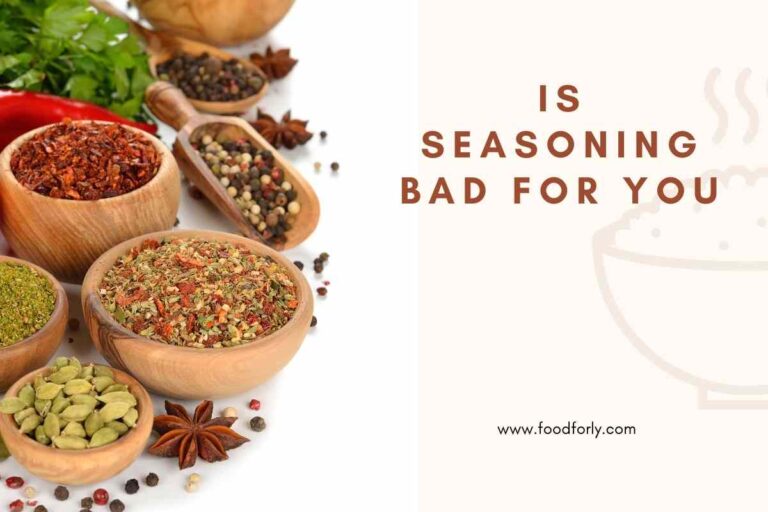What Does Accent Do To Food?
What Does Accent Do To Food? Accent, also known as monosodium glutamate (MSG), is a flavor enhancer commonly used in cooking. It is derived from glutamic acid, an amino acid found naturally in many foods. When added to food, Accent enhances the umami taste, which is often described as savory or meaty.
Here are some effects of Accent on food:
Enhances flavor: Accent intensifies the natural flavors of food, making it taste richer and more robust. It specifically enhances umami flavors, which are commonly found in meat, fish, mushrooms, and certain vegetables.
Balances flavors: Accent helps to balance and harmonize different taste components in a dish. It can enhance the sweetness, saltiness, and sourness of food, creating a more well-rounded flavor profile.

Increases depth: By adding Accent, chefs and home cooks can deepen the flavor of their dishes. It adds a complex and multidimensional taste that enhances the overall eating experience.
Improves aroma: Accent can enhance the aroma of food, making it more appetizing. It can contribute to a more enticing smell, particularly in dishes with meat or broth.
Reduces the need for salt: One of the advantages of using Accent is that it allows for the reduction of added salt in recipes. It provides a savory taste, similar to salt, without actually increasing sodium levels significantly.
It’s important to note that some individuals may be sensitive to MSG and may experience symptoms such as headaches, flushing, or sweating. However, the majority of people can consume MSG without any adverse effects. If you have concerns or sensitivities, it’s always best to check food labels or speak with your healthcare provider.
What Is In Accent?
Accent, or monosodium glutamate (MSG), is a flavor enhancer composed primarily of glutamic acid, a naturally occurring amino acid
What Is Accent In Food?
Accent, or monosodium glutamate (MSG), is a commonly used flavor enhancer added to food to enhance its taste, particularly the umami flavor.
What Is In Accent Flavor Enhancer?
The primary ingredient in Accent flavor enhancer is monosodium glutamate (MSG).
What Is In Accent Seasoning?
Accent Seasoning primarily consists of monosodium glutamate (MSG) as the main ingredient. It may also contain small amounts of salt and other flavor-enhancing ingredients. However, the exact composition may vary depending on the specific brand or manufacturer.
How Is Your Health Answer?
My answer regarding the composition of Accent Seasoning is accurate based on the general knowledge available up until my September 2021 training data.
However, it’s always a good idea to check the packaging or consult the manufacturer directly for the most up-to-date and specific information regarding the ingredients in any food product, including Accent Seasoning.
It’s also important to note that individual sensitivities or allergies may vary, so it’s best to consider personal health factors and consult with a healthcare professional if you have any concerns.
Whats In Accent Seasoning?
I apologize for the confusion. Accent Seasoning primarily consists of monosodium glutamate (MSG) as the main ingredient. It may also contain small amounts of salt and other flavor-enhancing ingredients.
However, the exact composition can vary depending on the specific brand or manufacturer. For accurate and up-to-date information, it is best to refer to the packaging or contact the manufacturer directly.
Why Is Accent Bad For You?
The safety and potential health effects of monosodium glutamate (MSG), the primary component of Accent seasoning, have been the subject of debate and research.
Some individuals may experience a sensitivity or intolerance to MSG, resulting in symptoms such as headaches, flushing, sweating, or other adverse reactions. This condition is commonly known as “Chinese Restaurant Syndrome,” although it can occur with the consumption of MSG from various sources.
However, the majority of people can consume MSG without any adverse effects. The U.S. Food and Drug Administration (FDA) has classified MSG as generally recognized as safe (GRAS) when consumed in normal amounts.
It’s worth noting that while MSG does contain sodium, it has lower sodium content per unit of taste compared to salt. However, if you have high blood pressure or are on a low-sodium diet, it is still important to monitor your intake of sodium-containing ingredients like MSG.
As with any food ingredient, moderation is key, and individual sensitivities or allergies may vary. If you have concerns about consuming MSG or Accent seasoning, it’s best to consult with a healthcare professional or avoid it altogether.
How To Make Accent Seasoning?
To make a homemade version of a flavor enhancer similar to Accent Seasoning, you can combine the following ingredients:
8 parts powdered or granulated monosodium glutamate (MSG)
1 part salt (optional)
Small amounts of other powdered flavor enhancers like onion powder, garlic powder, or dried herbs (optional)
Mix the ingredients together thoroughly and store in an airtight container. Use this homemade seasoning sparingly to enhance the flavor of your dishes. Please note that individual preferences may vary, and it’s important to consider any sensitivities or dietary restrictions when using or consuming such seasonings.
How To Use Accent Seasoning?
Accent Seasoning, or monosodium glutamate (MSG), can be used as a flavor enhancer in various dishes. Here’s a brief guide on how to use it:
Start with a small amount: Accent is a potent flavor enhancer, so it’s best to start with a small quantity and adjust according to taste.
Sprinkle on cooked dishes: Add a pinch or sprinkle of Accent directly onto cooked dishes such as soups, stews, stir-fries, or sauces. It can enhance the umami flavor and overall taste of the dish.
Use as a seasoning: Incorporate Accent into your spice blends or seasoning mixes to amplify the flavors. It can work well with other herbs, spices, and seasonings.
Experiment with different cuisines: Accent is commonly used in Asian and international cuisines. Try adding it to dishes like fried rice, noodles, marinades, or meat dishes for an extra savory kick.
Balance with other flavors: Consider the overall flavor profile of your dish. Use Accent to enhance and balance flavors but be mindful not to overpower other ingredients. It should complement the dish rather than dominate it.
Remember, individual taste preferences and dietary considerations may vary. It’s always a good idea to start with a small amount and adjust gradually based on personal preference.




